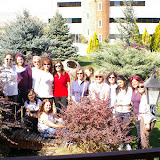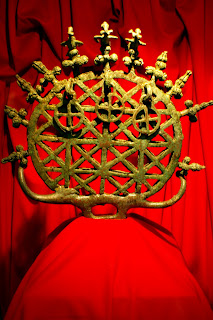Just newly recovering from a bout of holiday depression, I am in a bit of a better place now to take a look at what it is that I really and truly miss about home, Louisiana, USA. During the holidays the obvious components-family, friends, our food and traditions- definitely take a huge toll. Now, here, on maternity leave I have a new found chunk of time to due those extracurricular things that bring me pleasure. When I wake up in the morning and think about what I would like to do for the day involve whole foods, reading articles in a local coffee shop, walking in the woods, having sushi for lunch with friends, going to meditation at the Thai temple, seeing an independent or foreign film downtown, taking a yoga class... Unfortunately, all of the above are inaccessible to me in this country. So I realize my dilemma has both American and post-modern dynamics to it- nevertheless it brings me to realize what I miss the most about home, about my life and the things that I have learned since birth which bring meaning to it. I miss multiculturalism. Its the feeling of knowing the best of worlds, of growing up with an awareness, interest in, and tolerance of others. It is the beauty of living in a world surrounded by alternatives in every aspect of life that bring a plurality to everything you could think is possible.
Turkey is a country like none other I have lived in or traveled to before. Unlike Europe or even Latin America there is virtually no immigration from without the country (save a few expat spouses, military personnel, businessmen, and the rarely accepted refugee). Istanbul has its own story of diversity and move at a unique cultural pace than the rest of Turkey. We, however, are in Ankara and while all throughout Turkey there is an evident internal diversity-- pertaining to various regions (Black Sea, Aegean Sea, Eastern Turkey, Central Anatolia, Mediterranean), ethnic groups (Kurds, Lazics, Greeks, Turkmen), and religions (overwhelmingly Sunni with the most notable exceptions being Alevi muslims and the tiny Suriani Christian community)--there is not multiculturalism and tolerance of difference, well, that beckons another voluminous post to even touch the tip of the iceberg. For example, compared with my other experiences abroad, I virtually never get asked by Turkish neighbors, family members, friends, or even random strangers about my life in the US, what kinds of foods I like to cook or eat, what my family life is like, what traditions we have, what my city at home is like. When I first arrived in Ankara nearly two years ago I quickly noticed-what I then felt was- an eerie lack of curiosity about the only foreigner most of the people I came in contact with had ever met. I constantly received, at the time overwhelming and/or repetitive, explanations about what things Turkish people like, why they like them, that Turkish food and music were among the best in the world, and that the landscape of Turkey was so diverse and colorful. I later realized that most of these people weren't being haughty. More so, they had no springboard of cultural difference to work with to even begin to understand how it is that Turkey in my eyes could be different from their own. The few who had been to Germany at one point instantly assumed that I could speak German and were eager to share with me things about their experiences there in the language.
The nature of compliments I have received, for example, always related back to my ability to show acclimation to Turkish culture and language rather than being a unique expression of my own (odd to imagine some in the US complimenting a foreigner for being... so American): you are learning Turkish fast, you are like a good Turkish girl, you are a warm person, like us, you seem Turkish you are so open, etc.
I suppose life in the 40s, 50s before tolerance and multiculturalism became a large part of American life via festivals, film, and food could have resembled the Turkish situation.
There is, I assume, a sense of security in holding such a intimacy and singularity with ones own culture. However, there are benefits, at least to me, of experiencing the dynamism that living cultural diversity can bring.













